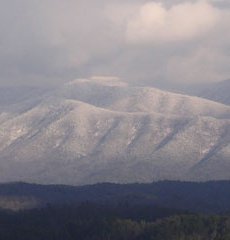Chestnut Tops Property Owners Association is committed to reestablishing the American chestnut on the roughly 200 acres of Chestnut Tops Community.
First discovered in 1904 in New York City, a blight that attacked the American chestnut spread quickly, killing some 4 billion American chestnuts across 9 million acres of Eastern forests within 50 years. In East Tennessee, the American chestnut stand was wiped out by 1935. The lethal fungus still survives on decaying logs and leaves, and today all that remains of these forest giants are shrub-sized root sprouts that usually succumb to the blight before they're old enough to bear flowers and fruit. The fungus kills American chestnuts by attacking the bark and girdling the tree. Because the fungus cannot survive in the soil, the roots of the chestnuts remain viable and continually produce sprouts.
Chestnut Tops Community is dotted with the hulks, stumps and some remaining small logs as reminders of the glory that the American chestnut once enjoyed here. The trees provided ample food and “mast” for bears, squirrels and people. By viewing the existing trees, it is easy to see that no other species has achieved the splendor and dominance of the American chestnut on Chestnut Tops and the surrounding countryside.
For almost 30 years, the American Chestnut Foundation has been backcrossing American chestnuts with Chinese chestnuts to produce a tree that is impervious to blight, but remains at least 94 percent American chestnut in genotype.
Virginia and Pennsylvania have made major strides in those breeding efforts, and Tennessee isn't too far behind. Only blight-resistant American chestnuts qualify as mother trees, and scientists say the key to success is to breed trees from local environments.
Researchers with the foundation say a blight-resistant American chestnut tree should be available for forest-test planting in some states as early as 2006. As of 2005, Tennessee is still about 12 years away from having trees available to plant in the wild.
Chad and Lisa Berry, property owners in Chestnut Tops, planted two of the blight resistant seedlings along Flats Creek near their campsite. We are all proud parents. This is the first of many to come in the future. The Chestnut Tops Property Owners Association sponsors the replanting and spread of the American chestnut for the enjoyment of future generations.
Douglas Cox

For More Information, Contact:
G. Douglas Cox
P.O. Box 4506
Maryville, TN 37802
Voice:
865.982.9089 (home)
865-386-6392 (cell) |

